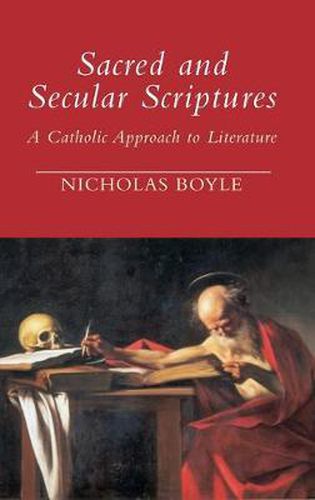Readings Newsletter
Become a Readings Member to make your shopping experience even easier.
Sign in or sign up for free!
You’re not far away from qualifying for FREE standard shipping within Australia
You’ve qualified for FREE standard shipping within Australia
The cart is loading…






This title is printed to order. This book may have been self-published. If so, we cannot guarantee the quality of the content. In the main most books will have gone through the editing process however some may not. We therefore suggest that you be aware of this before ordering this book. If in doubt check either the author or publisher’s details as we are unable to accept any returns unless they are faulty. Please contact us if you have any questions.
Nicholas Boyle’s latest work begins with an observation-from theologian and medievalist Father Marie-Dominique Chenu, O.P.-that the Bible should be seen as a divinely ordained mediation between human culture and divine truth. But how far can we say that the Bible is ‘literature’? Chenu is surely right that God is revealed in Scripture not through a system of ideas, but through a vivid historical narrative of people and places. But the Bible is also a sacred book. Expanding on this central dilemma, Boyle demonstrates that biblical scholarship and literary criticism must work together in the largely neglected task of integrating theology and modern secular culture.
Boyle explores two lines of thought. In the first series of essays, he discusses a range of writers, primarily philosophers and theologians, who have treated the Bible as literature as a means of reconciling the sacred and the secular. In the second series, Boyle moves to the theme of literature as Bible, seeking a Catholic way of reading secular literature.
These sophisticated and learned essays-drawn from the Erasmus Lectures Boyle delivered at the University of Notre Dame in 2003-cover a remarkable range of philosophers, theologians, and writers, including Herder, Schleiermacher, Hegel, Levinas, Goethe, Austen, Melville, and Tolkien. This volume will reward its reader with penetrating, and often brilliant, insights.
$9.00 standard shipping within Australia
FREE standard shipping within Australia for orders over $100.00
Express & International shipping calculated at checkout
This title is printed to order. This book may have been self-published. If so, we cannot guarantee the quality of the content. In the main most books will have gone through the editing process however some may not. We therefore suggest that you be aware of this before ordering this book. If in doubt check either the author or publisher’s details as we are unable to accept any returns unless they are faulty. Please contact us if you have any questions.
Nicholas Boyle’s latest work begins with an observation-from theologian and medievalist Father Marie-Dominique Chenu, O.P.-that the Bible should be seen as a divinely ordained mediation between human culture and divine truth. But how far can we say that the Bible is ‘literature’? Chenu is surely right that God is revealed in Scripture not through a system of ideas, but through a vivid historical narrative of people and places. But the Bible is also a sacred book. Expanding on this central dilemma, Boyle demonstrates that biblical scholarship and literary criticism must work together in the largely neglected task of integrating theology and modern secular culture.
Boyle explores two lines of thought. In the first series of essays, he discusses a range of writers, primarily philosophers and theologians, who have treated the Bible as literature as a means of reconciling the sacred and the secular. In the second series, Boyle moves to the theme of literature as Bible, seeking a Catholic way of reading secular literature.
These sophisticated and learned essays-drawn from the Erasmus Lectures Boyle delivered at the University of Notre Dame in 2003-cover a remarkable range of philosophers, theologians, and writers, including Herder, Schleiermacher, Hegel, Levinas, Goethe, Austen, Melville, and Tolkien. This volume will reward its reader with penetrating, and often brilliant, insights.